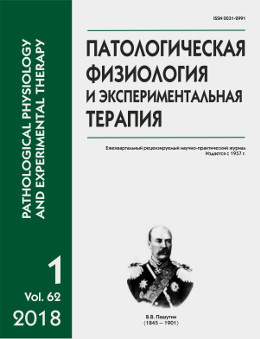Апоптоз тромбоцитов при глобальной ишемии головного мозга у крыс
DOI:
https://doi.org/10.25557/0031-2991.2018.01.27-35Ключевые слова:
тромбоциты, апоптоз, глобальная ишемия мозга, аннексин-5, митохондриальный мембранный потенциал, проточная цитометрияАннотация
Цель исследования. Ишемические повреждения головного мозга, являются одной из наиболее частой причин инвалидности и смертности во всем мире. Недавно была установлена роль апоптоза тромбоцитов в патофизиологии инсульта, однако его механизмы до сих пор остаются невыясненными. Несмотря на различные экспериментальные модели, направленные на мониторинг апоптоза тромбоцитов, результаты, относительно изучения и выявления апоптоза тромбоцитов при ишемии головного мозга у крыс, весьма немногочисленны. Цель исследования – анализ апоптоза тромбоцитов с помощью метода проточной цитофлуориметрии на модели глобальной ишемии мозга у крыс. Методика. В экспериментах использовано 6 крыс-самцов Вистар в возрасте от 5 до 6 мес, разделенных на 2 группы: интактный контроль (К) и глобальная ишемия головного мозга. Модель глобальной ишемии головного мозга у крыс воспроизводилась путём билатеральной окклюзии общих сонных артерий на фоне гипотензии. Суспензию тромбоцитов крыс получали методом гельфильтрации с использованием сефарозы 2B. Для анализа экстернализации фосфатидилсерина (ФС) тромбоциты крыс инкубировали с Аннексином V-PE в связывающем буфере, для оценки митохондриального мембранного потенциала (ММП) тромбоциты инкубировали с катионным красителем JC-1. После инкубации образцы немедленно анализировали на проточном цитофлуориметре FACSCalibur (Becton Dickinson, США). Результаты. Согласно полученным данным, экстернализация ФС на тромбоцитах крыс, перенесших инсульт, была значительно (в 10 раз) выше, чем в контрольной группе крыс. Данный эффект подтверждается выраженной деполяризацией митохондриальных мембран (ΔΨm). После экспериментальной ишемии мозга почти 40% тромбоцитов было деполяризовано. Заключение. Использованный в работе подбор методов и маркеров обеспечивает понимание механизмов апоптоза тромбоцитов, как в экспериментальных, так и в клинических условиях. Полученные данные позволяют сделать заключение, что апоптоз тромбоцитов является одним из факторов развития глобальной ишемии головного мозга у крыс. Результаты могут быть использованы для понимания механизмов, участвующих в развитии ишемического повреждения, что, в свою очередь, может быть использовано при разработке новых терапевтических стратегий.Загрузки
Опубликован
2018-01-25
Выпуск
Раздел
Оригинальные исследования
Как цитировать
[1]
2018. Апоптоз тромбоцитов при глобальной ишемии головного мозга у крыс. Патологическая физиология и экспериментальная терапия. 62, 1 (Jan. 2018), 27–35. DOI:https://doi.org/10.25557/0031-2991.2018.01.27-35.













